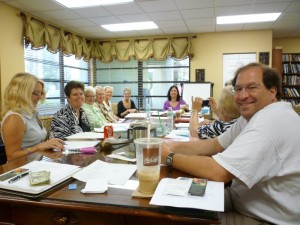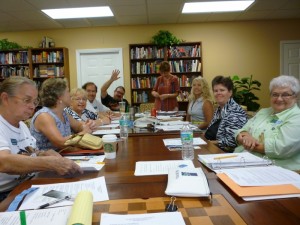Nancy J. Cohen
This past weekend, I had the privilege of speaking to the Southwest Florida Romance Writers in Estero, Florida. Up to 25 members were present when I spoke about Social Networking for Writers and passed around my eight-page handout. We could have discussed this topic for a lot longer than the allotted hour, but our time ended and I left for home.
On the drive back to the east coast, I reflected on how a speaker really has to gear her talk to the audience. Speaking to a bunch of writers is a lot different than giving a talk to a roomful of fans. Readers in general are eager to hear how you got published, where you get your ideas, what you researched for your story, and if you make a living at what you do. Don’t ask me why, but that question always arises. Would you ask a lecturer how much money he makes?
You’re expected to be witty and entertaining and to use anecdotes in your talk. I like to educate the public on the realities of the publishing business, so I’ll talk about the impact of the digital era, choices for writers today, and what readers can do to help authors in terms of customer reviews, Liking our pages, sharing our posts, etc. Lay persons find this information to be fascinating. Sure, I’ll talk about my books but mainly as an overview about my series and some of my research experiences. I don’t believe in doing readings or a book review on a specific title. There’s nothing more boring, IMHO, as an author’s droning voice as he reads from his own work. It’s more exciting to talk off the cuff about the publishing world and what fuels my stories.
In contrast, when speaking to fellow writers, I aim to teach. I want to get points across that they can take home and use in their own work. Motivational talks uplift and inspire writers to keep plowing ahead despite the setbacks that we all experience in this career. I’d rather give practical tips, how-to details, and specific instructions. Handouts accompany all of my workshops. This is not necessarily the case if I’m on a panel, however. Then it’s much harder to get across a lot of information because you’re sharing the time and stage. It’s good to come prepared with a few pointers regardless, and handouts are still appreciated, but having one hour to myself is best for in-depth instruction.
I’ve attended panels at writers conferences where the authors prattle on about their work, and attendees leave the room having been entertained but learning nothing new. I don’t care to attend those types of sessions myself. I’d rather go to a workshop where I can gain new insights or tips on a specific aspect of writing or marketing. Anybody can talk about himself. How many can teach in a meaningful, clear manner? Those who can’t teach will do very well speaking on panels at fan conventions, libraries and community groups.
Where am I going with this? If you have a speaking engagement coming up, consider your audience. If it’s a bunch of fans/readers, talk about your books, the publishing world, where you get your ideas, the writing process. If it’s a group of writers, target your material so they can take away something worthwhile.
If you’re a reader, what do you like to hear when you go to see an author? If you’re a writer, do you differentiate how you approach each audience?



Good question, Nancy. If I’m giving a keynote, I try to make it all about one “thing.” In law school I got to pick up Thurgood Marshall at the airport and bring him to his hotel (he was judging our Moot Court competition). I asked him what he thought the key was to a great oral argument in the Supreme Court. He said without hesitation that the effective argument is about ONE THING–a fundamental principle or point of law that is the bedrock. If the advocate tries to argue other tangents, it weakens everything.
I never forgot that, and make that central to my speaking to large groups: one thing, one takeaway.
In a workshop, the subject matter will be “one thing” but I also want to give as many practical tools as possible to help the writers accomplish it.
One time years ago, Barnaby Conrad “interviewed” Joseph Wambaugh on stage at the Santa Barbara Miramar, where Wambaugh was the guest speaker at the wonderful Santa Barbara Writers Conference. Conrad explained to the audience that Wambaugh was shy and reluctant to just stand up there and talk about himself. So they had agreed to this interview format.
Conrad’s first question was something rather innocuous. Then Wambaugh stepped up to the microphone, hesitated and proceeded to speak non-stop for over an hour with a break.
…without a break.
Talk about blowing the punchline.
James, that’s good advice. I will remember it if I am ever invited to do a keynote.
Jim, an interview format sounds like a good way to get a reluctant speaker going.
I just returned from Left Coast Crime, which is definitely geared toward readers. All the points you made were well demonstrated during the panels. They also had interviews with the ‘big names’ but I confess I didn’t attend those. I find I need down time when I’m at these conferences, and since the authors in question weren’t ones I’d read, I opted to hang out and schmooze (at the bar, usually).
Terry
Terry’s Place
My main criteria is feeling like the speaker is there for me (the metaphorical me), not just to collect the stipend or the freebie trip or to hang out with the other hotshots.
I remember passing through an autograph line at a con where two of the stars weren’t even looking eyes forward or acknowledging the crowd existed. They were scribbling signatures while they talked a mile a minute to each other. I had them sign my program and then I took it home and sold it for $50 and never, ever forgot it. One of those stars has now written a book. I don’t have it.
For keynotes, definitely “the one big thing.” For interviews and panels, I like real world stuff and war stories and being treated seriously by the speakers. One of the best lines ever came from Jeffery Deaver, “boys and girls, it’s a business.” His autograph is not for sale.
Terri
We certainly need to gear our talks specifically to each audience. In the past few months I gave two talks and am scheduled to do a third on similar subjects to very different audiences.
The first case was a presentation on the world of audiobooks given to a group of authors interested getting their books into audio format. The second was a presentation on acting and audiobook arts specifically for Christian religious audiences and materials delivered to church based teens & college kids. The third scheduled for next month is the “World of Audiobooks” for a day long writer’s workshop for the Anchorage School District’s junior high and high school kids.
Each one must be toned and tempered for the specific audience even though they are basically the same presentations.
I think it is very important to make a direct connection with your audience and to make sure their take-home info is what they find valuable and useful for their specific circumstance.
Terry, schmoozing at conferences is my main objective. Author interviews may be illuminating for fans but I don’t attend them either.
Terri, your comments are spot-on. It’s really rude for authors/celebrities not to spend a few minutes making eye contact with each person in line and speaking briefly with them. That’s the least one can do to show appreciation for their attendance. People remember it if an author is courteous.
Basil, how great that you could tailor the same talk for 3 different audiences. It will be valuable to each group because you care enough to address of their needs specifically. Wish I could have attended the first one.